
Humberto Montes de Oca is the international secretary for the Mexican Electrical Workers union. Two years ago, its 44,000 members were all fired when the Mexican government took over generating stations by force to set the stage for privatizing electricity. Montes de Oca describes the role the union has played on the left in Mexico, its resistance to privatization and the way fired workers are now forced to migrate to survive. He was interviewed by David Bacon.
Our organization is the oldest democratic union in Mexico. The Mexican Electrical Workers Union [SME by its Spanish initials] was founded in 1914 when the armies of Emiliano Zapata took Mexico City. Our founders saw that the peasant insurrection would finally create the conditions for their efforts to organize and succeed. They’d already made many attempts to set up the union in underground conditions and endured repression because of it.
In 1916, we organized Mexico’s first general strike. Our leaders were imprisoned and condemned to death, but their lives were saved by huge demonstrations. In 1936, we went on strike against the Mexican Power and Light Company, which at that time had US, British and Canadian owners. Mexico City went without electricity for ninety days, except for emergency medical services. The strike was successful and led to the negotiation of one of the most important labor contracts in Latin America. That strike helped set the stage for the nationalization of oil, and created the political conditions that made the expropriation possible.
Then in 1960, we were one of the organizations that pushed for the nationalization of electrical power. President Adolfo Lopez Mateos modified Article 27 of the Mexican Constitution and added a paragraph that says that the Mexican government has the exclusive right to provide electricity to the country. Since then, under the Constitution, public electrical service can be provided only by the state.
In 1992, President Carlos Salinas de Gortari changed the regulations to take some kinds of electrical generation out of the public sphere and since then a lot has been in private hands. This started a process of privatizing electricity through secondary laws. In 1994, the company Power and Light was decentralized and it was closed in 2009, putting its 44,000 workers out in the streets.
For the previous ten years, these workers, members of the SME, had resisted the privatization of electricity. In 1999, then-President Ernesto Zedillo launched an effort to privatize it through Constitutional reform, by eliminating the 6th paragraph of Article 27, which made the industry the exclusive property of our nation. Zedillo tried to dismantle it. He proposed allowing the creation of private companies for the generating, transmission, distribution and sale of power.
The union reacted quickly to stop it. We formed a front of resistance and we succeeded because we were able to bring together many social movements that were opposed to privatization. Zedillo’s proposal was defeated.
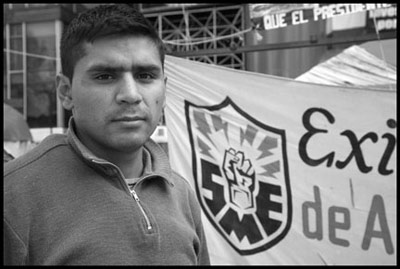 Leobardo Benitez Alvarez lived in a tent in front of the office of the Federal Electricity Commission on the Reforma in downtown Mexico City for months, protesting the actions of the Mexican government in firing 44,000 electrical workers and smashing their union. (Photo: David Bacon)Later, President Vicente Fox made another attempt at privatization. This time he didn’t try to change the Constitution. He tried to change the Public Law for Providing Electricity, a secondary law. He wanted the public enterprises to supply electricity only to homes. Private enterprises would provide it to large-scale consumers, like commercial and industrial users. This initiative was also defeated. In the same way, the union organized a front of organizations against it.
Leobardo Benitez Alvarez lived in a tent in front of the office of the Federal Electricity Commission on the Reforma in downtown Mexico City for months, protesting the actions of the Mexican government in firing 44,000 electrical workers and smashing their union. (Photo: David Bacon)Later, President Vicente Fox made another attempt at privatization. This time he didn’t try to change the Constitution. He tried to change the Public Law for Providing Electricity, a secondary law. He wanted the public enterprises to supply electricity only to homes. Private enterprises would provide it to large-scale consumers, like commercial and industrial users. This initiative was also defeated. In the same way, the union organized a front of organizations against it.
The experience of the past privatizations, including even those in the US, is that private owners invest their money to make a profit, not to provide a service. That affects the users of services, because the rates they pay go up while the quality of the services provided goes down. Investors care only about their profits. They don’t invest in maintenance or in the means by which the service is provided. High rates and deficient service, in other words.
For workers, it means losing what we’ve achieved over decades of struggle. Things start going backwards. What we have now isn’t some kind of privilege, but rights that cost a lot to win. They are the minimum which allow us to work with dignity and support our families and ourselves.
One important aspect of our contract is called the agreement among different parties. This requires the company management to consult with the union about changes they want to make that affect our work. In other words, they can’t make unilateral changes. Few other unions have this and we’ve used it to protect users and ratepayers.
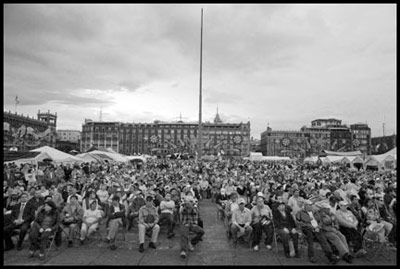 One of the many mass demonstrations in the Zocalo in Mexico City, protesting the firing of SME members. (Photo: David Bacon)The contract covers benefits as well. We have strong protections for health and safety that force the company to maintain a safe workplace, as well as changing rooms and showers. We have vacations and sick leave and we can take leaves of absence. We have a fund that helps workers find adequate housing. If you’ve worked there a long time, the company will help you build or buy a home. We have the aguinaldo [an extra month’s salary distributed at the end of the year] and a savings fund in which the company matches what workers contribute. Basically, our contract means that we have the minimum conditions you need for a decent life
One of the many mass demonstrations in the Zocalo in Mexico City, protesting the firing of SME members. (Photo: David Bacon)The contract covers benefits as well. We have strong protections for health and safety that force the company to maintain a safe workplace, as well as changing rooms and showers. We have vacations and sick leave and we can take leaves of absence. We have a fund that helps workers find adequate housing. If you’ve worked there a long time, the company will help you build or buy a home. We have the aguinaldo [an extra month’s salary distributed at the end of the year] and a savings fund in which the company matches what workers contribute. Basically, our contract means that we have the minimum conditions you need for a decent life
Really, the only effort to privatize electricity that succeeded was that of 1992. Eventually, 50% of the power in Mexico was produced by private generators in a process that was known as “hidden generation.” After the subsequent privatization efforts were defeated, the rightwing governments, with their neoliberal policies, decided to use force, to privatize through action, rather than legislation. We say they tried to take the fish out of the fishbowl and when that didn’t work, to break the bowl.
Before taking action, the government mounted a campaign for months to discredit the company, the workers and our union. It intervened directly in the life of our union, in violation of the law, seeking to divide workers and buy off some of the union’s leaders. The government refused to recognize our elected leadership, as a way of denying our union its legal right to exist and function.
The government sought to turn public opinion against us. To ratepayers, it said the company wasn’t productive, that it was inefficient and had become a public charge. The workers were privileged and their contract was expensive and a burden on the Mexican people. The union was inflexible and corrupt, they said and the workers were lazy. All this was on radio, on TV and in the movies – everywhere, creating the preconditions for action.
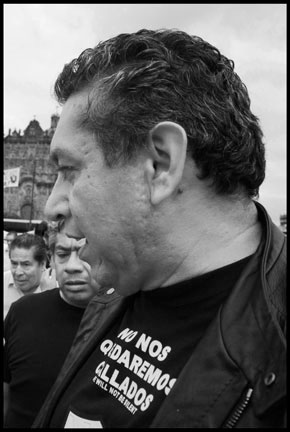 Humberto Montes de Oca. (Photo: David Bacon)Then on October 9, 2009, President Felipe Calderon issued a decree to end the existence of Power and Light and brought in 27,000 soldiers and Federal police to expel our members from their workplaces. This was a military assault on workers. Many of us were injured in the violence. Since then, the Federal Preventive Police have continued an occupation of our worksites. They’ve stolen tools and equipment. They’re looting the company.
Humberto Montes de Oca. (Photo: David Bacon)Then on October 9, 2009, President Felipe Calderon issued a decree to end the existence of Power and Light and brought in 27,000 soldiers and Federal police to expel our members from their workplaces. This was a military assault on workers. Many of us were injured in the violence. Since then, the Federal Preventive Police have continued an occupation of our worksites. They’ve stolen tools and equipment. They’re looting the company.
There was no judicial order and the action violated the Constitution and Mexican law. Immediately after, the government published a decree against the union and launched a campaign to defend its use of the military against workers. The closing of the company was portrayed as justified and in the best interest of the Mexican people. Calderon went on TV and said that with the closing of the company the electrical rates would go down and the quality of service would improve. There would be more generation and we’d have thousands of new jobs. That justified his authoritarian and illegal action.
But the president has no authority to close a national public enterprise that has a strategic value to the nation. Only Congress can take such an action and end the existence of a company. The government violated the labor and human rights of the workers, without even a hearing about these issues. There was no warning about the firings, which violates the labor law. There was no notice to the labor board that a conflict existed – without it the workers have a right to stay in their jobs. The decree dissolving the company was clearly illegal. It had no right to cancel our labor contract or dissolve our union either.
The government had a secret document that was recently declassified. In it, they analyze the possible effects of destroying our union and predict that we wouldn’t last more than three months. It predicted we’d be violent and that we’d try to reenter our workplaces by force. That’s why the brought in thousands of police and soldiers. One high military officer revealed that it wasn’t the police that took control of our workplace, but the army. They were prepared to repel any action by workers and stop any sabotage of our workplaces. But we never would do that. We have a historical memory and we’ve resisted the government before. In July 2012, Calderon will be gone and we’ll still be here.
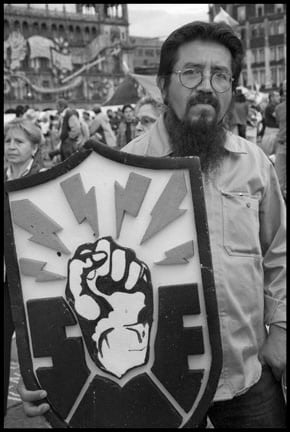 A fired worker holding the shield of his union, the SME. (Photo: David Bacon)The government tried to bribe the workers, promising them twice the normal severance pay if they resigned their jobs. They took out full-page ads in the papers and said the first 10,000 who resigned would get jobs in the Federal Electricity Commission. They promised loans to help people start businesses. They promised training for jobs out of the industry, even classes to learn English in case they wanted to come to the US.
A fired worker holding the shield of his union, the SME. (Photo: David Bacon)The government tried to bribe the workers, promising them twice the normal severance pay if they resigned their jobs. They took out full-page ads in the papers and said the first 10,000 who resigned would get jobs in the Federal Electricity Commission. They promised loans to help people start businesses. They promised training for jobs out of the industry, even classes to learn English in case they wanted to come to the US.
So 28,000 workers gave up their jobs. The government said they weren’t fired – they’d quit. And those who quit couldn’t find jobs anywhere. But 16,000 people refused to quit and for two years we have been resisting. There’s been no legal solution for us.
We’ve been organizing support among users and ratepayers. In their effort to keep the system going, the government has brought in workers with no experience. They have no training in providing uninterrupted service. As a result, in central Mexico, especially in Mexico City, there have been constant blackouts. The lights go out, leaving people sitting in the dark. These workers have not been able to reestablish the service as we provided it before.
We’ve proposed a legislative solution to create a new employer, to take the place of Power and Light, which would employ the workers and keep the union contract. We also tried to negotiate a solution with the Secretary of Labor. In 2011, we occupied the Zocalo, the main plaza, for six months. We were the first Occupy. On the 13th of September, before our national anniversary, we negotiated an agreement with the government. They said they’d reemploy our members and free the twelve leaders who are still in jail. We said we’d leave the plaza. But right after we made the agreement with Interior Minister Francisco Blade Mora, his plane crashed – the second interior minister to die in a plane crash in the last six years.
 Workers live in tents in the planton, or Occupy-style encampment they set up in the Zocalo. The banner says, “We’ve had it up to here with the killings!” – referring to political repression in Mexico. (Photo: David Bacon)The new interior minister refused to recognize the agreement. So the route of negotiations was closed. Now we’re pursuing a fourth road. We won legally, in the legislature and through negotiations, but nothing changed. The next route is political and electoral. At present, there is no political party that represents our interests. In 2010 and 2011, we launched a political organization for people and workers. We’re working especially with SNTE Section 18, the teachers union in Michoacan.
Workers live in tents in the planton, or Occupy-style encampment they set up in the Zocalo. The banner says, “We’ve had it up to here with the killings!” – referring to political repression in Mexico. (Photo: David Bacon)The new interior minister refused to recognize the agreement. So the route of negotiations was closed. Now we’re pursuing a fourth road. We won legally, in the legislature and through negotiations, but nothing changed. The next route is political and electoral. At present, there is no political party that represents our interests. In 2010 and 2011, we launched a political organization for people and workers. We’re working especially with SNTE Section 18, the teachers union in Michoacan.
At the same time, we are supporting Andres Manuel Lopez Obrador as candidate for President, because he’s promised that if he’s elected he will revive the Power and Light company and reinstate the 16,000 workers with their SME union contract. This is not a corporatist effort. We made the decision in a general meeting, but no one is obligated to support Andres Manuel. No matter what the result, we will continue to resist until we win.
Certain rights are written into the Mexican Constitution. Every person has the right to work, to Social Security, to public free education, to culture, to health. These are social rights that the free trade regime is pulling apart. This is the effect that free trade agreements have had throughout the world. There’s a ferocious competition for markets, in terms of money, for labor markets, for energy, even now markets in terms of environmental protections or the lack of them.
The expansion of free trade comes with a wave of violence against society and against social and democratic rights. This generates the expulsion of citizens from one country to another and produces the phenomenon of migration, as people seek opportunity and access to the minimum they need to survive.
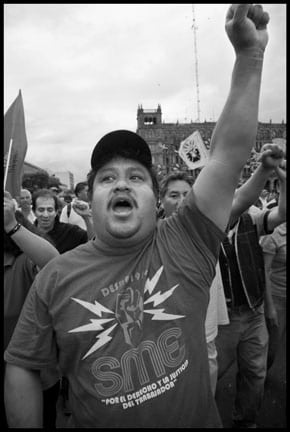 An electrical worker protests his firing. (Photo: David Bacon)This is what’s happened in Mexico. Mexico is exporting its labor force – people who are expelled from their land and communities and jobs. So they leave for another country, in our case, for the United States.
An electrical worker protests his firing. (Photo: David Bacon)This is what’s happened in Mexico. Mexico is exporting its labor force – people who are expelled from their land and communities and jobs. So they leave for another country, in our case, for the United States.
The government uses the remittances that come back to Mexico, like the income from the oil, to compensate somewhat for the fact that the social budget in this country keeps shrinking. The money has helped to soften some of the sharp contradictions. But the amount of money available for this purpose keeps shrinking all the time, because the economic crisis is hitting so hard. It’s not a sustainable model for economic development. It keeps economic activity going to some degree in the communities where people are sending back money, but in the long run, this can’t be sustained.
The labor law reform will push this process further along, because it exacerbates the flexibility of labor, and jobs become unstable and wages go down. It generates a greater and greater desperation among people being pushed out. These are people who can’t find a place in the labor market any longer.
In the case of the SME, which suffered the termination of 44,000 workers, we’re now finding that we have coworkers who were fired, who never accepted the severance bribe, living in the United States. These are workers who belong to the resistance and who went there to survive. We also have compañeros who’ve gone to Canada to survive.
We’ve tried to maintain contact with many of them. On certain important events, such as the anniversary of the founding of the union this past 14th of December, some fly back from Tucson and San Antonio to Mexico City to participate. So our fight in Mexico is making a contribution to the labor movement in the US too. We’re exporting the struggle and the workers who experienced it. The expulsion of militant activists to other places means that we’re also exporting the experience of resistance and class consciousness.
Article and photos copyright © by David Bacon.
Press freedom is under attack
As Trump cracks down on political speech, independent media is increasingly necessary.
Truthout produces reporting you won’t see in the mainstream: journalism from the frontlines of global conflict, interviews with grassroots movement leaders, high-quality legal analysis and more.
Our work is possible thanks to reader support. Help Truthout catalyze change and social justice — make a tax-deductible monthly or one-time donation today.